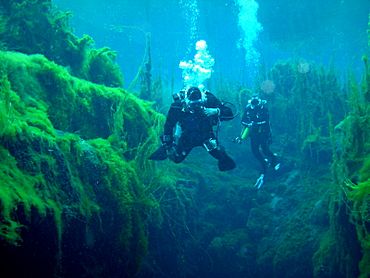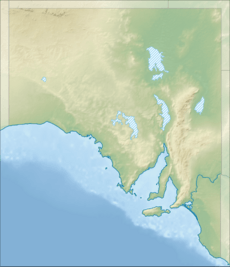Piccaninnie Ponds Conservation Park facts for kids
Quick facts for kids Piccaninnie Ponds Conservation ParkWye, South Australia |
|
|---|---|
|
IUCN Category III (Natural Monument)
|
|

Cave diving at Piccaninnie Ponds
|
|
| Nearest town or city | Donovans |
| Established | 16 October 1969 |
| Area | 8.64 km2 (3.3 sq mi) |
| Managing authorities | Department for Environment and Water |
| Website | Piccaninnie Ponds Conservation Park |
| Footnotes | |
| Official name: Piccaninnie Ponds Karst Wetlands | |
| Designated: | 21 December 2012 |
| Reference #: | 2136 |
| See also | Protected areas of South Australia |
The Piccaninnie Ponds Conservation Park is a special natural area in southeastern South Australia. It's a protected place, meaning its plants, animals, and unique features are kept safe. This park covers about 862 hectares (which is like 2,130 football fields!). It's located near the city of Mount Gambier.
The park was first set up on October 16, 1969, to protect its amazing freshwater springs and the land around them. It's known for its incredibly clear water, which makes it a popular spot for exploring underwater.
What is Piccaninnie Ponds Conservation Park?
Piccaninnie Ponds Conservation Park is found in the south-east of South Australia. It's in a place called Wye, right on the coast near Discovery Bay. The park is about 490 kilometers southeast of Adelaide, the state capital. It's also only about 30 kilometers southeast of Mount Gambier.
This conservation park protects a special type of wetland. This wetland is fed by cool, clean freshwater that bubbles up from springs underground. The area is a karst landscape, which means the ground is made of soft rock like limestone that water can easily shape.
The park is very close to the border with Victoria. It's also part of a larger area called the Discovery Bay to Piccaninnie Ponds Important Bird Area. This area is recognized by BirdLife International as being super important for many different bird species from all over the world. Piccaninnie Ponds is also listed as a Ramsar site, which means it's a wetland of international importance.
You can explore the park by walking along a track through the coastal woodland. This path leads to a viewing platform where you can look out over the beautiful wetlands.
Exploring Underwater at Piccaninnie Ponds
Piccaninnie Ponds is a very popular place for both snorkelling and cave diving. The water here is amazingly clear, which makes it perfect for seeing what's beneath the surface.
Back in 1964–1965, before it became a national park, a famous underwater explorer named Valerie Taylor visited the ponds. She said the crystal clear water made her feel like she was flying! She even called it "one of the most beautiful sights in Australia."
There are three main spots that divers love to explore here:
- The First Pond is an open area that's about 10 meters deep. It has a soft, silty bottom and lots of plants around the edges. Many aquatic animals live here.
- The Chasm is a deep sinkhole that goes down more than 100 meters! It's a truly impressive sight.
- The Cathedral is an enclosed underwater area. It has cool limestone formations and is about 35 meters deep.
The water is so clear that you can often see more than 40 meters ahead of you underwater. This makes it an incredible place to explore. However, you need a special permit to go snorkelling or cave diving at Piccaninnie Ponds. This helps keep everyone safe and protects the delicate environment.
Plants and Animals of Piccaninnie Ponds
The ponds are home to many different kinds of native plants. You can also find various freshwater fish, eels, and shrimp living in the clear waters. This rich environment supports a diverse range of life, making the park a vital habitat.
 | May Edward Chinn |
 | Rebecca Cole |
 | Alexa Canady |
 | Dorothy Lavinia Brown |


